Affiliate marketing sounds simple. You let others promote your products and pay them when they bring in sales. But once you start, real challenges begin to show up.
Running an affiliate program is tough without good software. You worry about missing sales, your affiliates get frustrated with late payments, and you waste hours updating spreadsheets by hand. Meanwhile, other companies attract the best promoters because their systems work smoothly.
An affiliate software helps turn that complexity into something manageable. It acts as your program’s control center, helping you automate manual work, track referrals accurately, reward partners, and analyze results all in one place.
In this guide, you’ll learn exactly what affiliate software is, how it works, and how it differs from an affiliate network. We’ll walk you through key features to look for, different types of software options, and the most common challenges you may face. You’ll also find tips to help you choose the right solution for your store business.
Picking the right affiliate software can help you scale faster, save time, and create strong partnerships with your affiliates. But with so many options on the market, making the right choice isn’t always easy. You’ll need to consider your business type, goals, level of control, and growth plans.
Potential Revenue with Affiliates (UpPromote)
Estimate the potential revenue when you recruit affiliates: comparing Current Business and Business + UpPromote.
Estimated Impact
Quickly visualize how affiliates can boost your orders and revenue.
Revenue Comparison: Current vs. with UpPromote
The chart illustrates relative revenue growth comparing two scenarios: organic sales vs. organic + affiliate-driven sales.
- Affiliate traffic quality is equal to your current traffic.
- AOV and Conversion Rate remain stable.
- Does not account for churn, refunds, or potential upsell/cross-sell.
If you’re looking for a powerful and beginner-friendly option, try UpPromote, the top-trusted Shopify affiliate solution for growth, featuring a 4.9/5 rating and over 2,500 reviews. With no upfront cost, it’s a great place to start.
Bring your affiliate program to life without the tech headaches or budget stress. UpPromote helps you track, reward, and scale your program with ease.
What is Affiliate Software?
Affiliate software is a tool that helps you build, manage, and grow your affiliate program, all in one place. It acts as the control center for everything you do with affiliates, from signing them up, creating trackable links, to monitoring referrals and paying commissions.
In simple terms, affiliate software takes away the manual, complicated parts of managing affiliates. It gives you clear data, saves you time, and helps you run a smooth, reliable program so you can focus on growing your business.
How Does Affiliate Software Work?
Affiliate software handles everything behind the scenes of your affiliate program. Let’s bring the process to life with this simple visual:
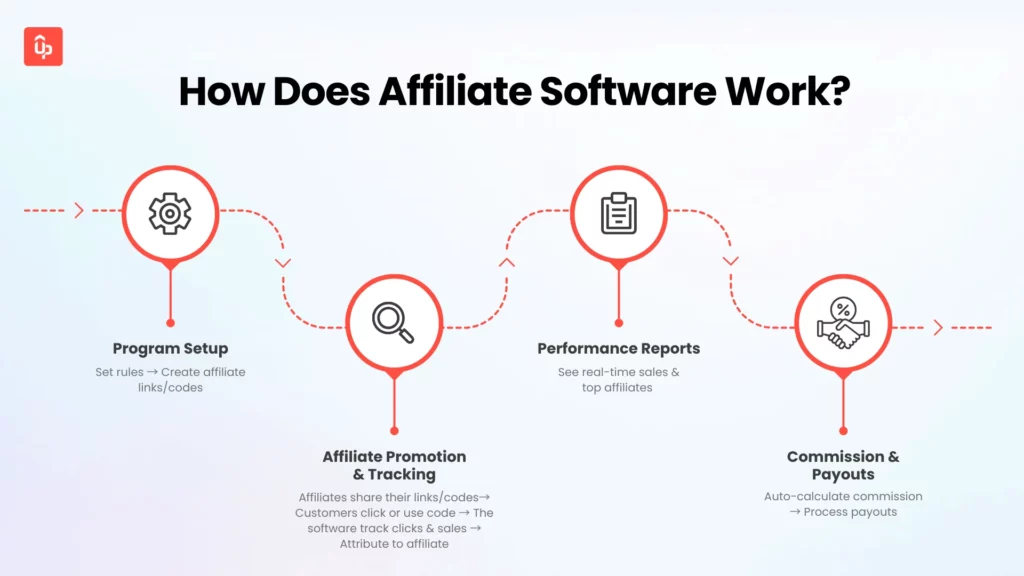
- Setting up an affiliate program: You create your program using affiliate software. Set the rules, like commission rates and tracking methods, and the system automatically generates unique links or discount codes for each affiliate.
- Affiliate promotion and tracking: Affiliates promote your products using their personal links or codes on websites, social media, or email. When someone takes a desired action (like a purchase or sign-up), the software tracks it and attributes the credit to the right affiliate.
- Performance monitoring and reporting: The affiliate software monitors the performance of each affiliate. You will get real-time reports so you know which partners drive the most sales, where your traffic comes from, and which products perform best.
- Commission calculation and payment: Once a conversion is verified, the software calculates the commission based on your rules. It also helps you organize and process payouts through your preferred payment methods.
Who Uses Affiliate Software and Why?
Affiliate software supports every player in the affiliate marketing game, from brands running programs, to affiliates promoting them, and agencies managing everything behind the scenes.
Let’s break it down:
1. Merchants/ Brands/ Advertisers
These are businesses that want to grow through affiliate marketing, whether they sell products, subscriptions, or services.
They use affiliate software to:
- Create and run their affiliate programs
- Track traffic, conversions, and sales
- Manage commissions and payouts with less effort
👉Why: Managing an affiliate program manually is messy, time-consuming, and hard to scale, especially as your list of partners grows.
2. Affiliates (Bloggers, Influencers, Content Creators)
Affiliates promote the brand’s products and earn commissions for successful referrals.
They rely on affiliate software to:
- Access their personal affiliate portal
- Get unique tracking links or coupon codes
- Download promotional materials
- Monitor performance and earnings in real time
👉Why: They need a central place to get their tools, track results, and know exactly how much they’ve earned, without confusion or delays.
3. Affiliate marketing agencies
Agencies manage affiliate programs on behalf of multiple brands.
With affiliate software, they can:
- Oversee campaigns across different clients
- Analyze performance and fine-tune strategy
- Deliver clean, real-time reports to each brand they support
👉Why: Spreadsheets and scattered tools create chaos. Agencies need a centralized platform to keep everything on track and deliver results at scale.
Benefits of Using Affiliate Software
Using affiliate software helps both merchants and affiliates work more efficiently, grow faster, and build stronger partnerships.
Here’s how both sides benefit:
For merchants
- Save time with automation by reducing manual work in tracking, commission calculation, and payouts. No more spreadsheet chaos.
- Get full visibility into performance through real-time data on clicks, sales, and top affiliates, all in one place.
- Scale without extra overhead as the platform helps manage hundreds of affiliates without adding complexity.
- Improve cost-efficiency by paying only for verified results, ensuring your budget is tied to actual performance.
- Customize your program freely with flexible commission rules, bonuses, and branded materials that reflect your strategy.
- Prevent fraud and protect your brand using tools that detect fake clicks, coupon misuse, and other suspicious behavior.
- Manage affiliate relationships easily with centralized onboarding, communication, and ongoing support.
For affiliates
- Track performance clearly with access to real-time dashboards showing clicks, conversions, and earnings.
- Get ready-to-use tools like unique links, coupon codes, and pre-approved creative assets without waiting for the brand.
- Access insights to improve by reviewing what works and adjusting promotional strategy accordingly.
- Receive payouts on time with accurate, scheduled commission payments that build trust and motivation.
Types of Affiliate Software Solutions
Affiliate software comes in different forms, and the right one depends on how much control, flexibility, and technical involvement you want. Here are the three main types you’ll come across:
1. Self-Hosted Software
This type gives you full control over the software. You install it on your own server and manage everything, from setup to security. It’s highly customizable, but requires in-house technical skills and has higher upfront costs.
2. Hosted Software
The software runs on the provider’s servers, but you still get a dedicated setup for your business. It offers some flexibility and removes the burden of server management, but can come with higher costs due to setup and hosting fees.
3. SaaS (Software as a Service) / Cloud-Based Software
This is the most popular option for modern businesses. The provider hosts and manages everything, and you simply log in via browser. It’s easy to use, requires no technical setup, and is ideal for merchants who want to launch quickly and scale smoothly.
To help you compare more clearly, here’s a quick breakdown of how they differ across key criteria:
| Self-Hosted | Hosted | SaaS (Cloud-Based) | |
| Hosting & Maintenance | Managed by your team | Shared (provider + your team) | Fully managed by the provider |
| Customization Level | Full control | Moderate customization | Depending on the provider |
| Security & Updates | Your team handles everything | The provider handles most updates | The provider handles all updates and security |
| Tech Requirements | High (in-house IT needed) | Moderate (setup support may be needed) | None – no technical team required |
| Upfront Cost | High (one-time + server costs) | Medium (setup or ongoing fees) | Low (monthly or annual subscription) |
| Key Advantages | Full control, custom features, and own data | No self-setup, provider support available | Easy to launch, scalable, low cost, secure |
| Considerations | High burden, needs IT resources | Less control, potentially higher fees | Reliant on the provider |
💡So, what does all this mean for your decision?
Choosing the right type of affiliate software depends on how much control you need and how much complexity you’re willing to manage.
Self-hosted tools offer full control, but they come with a heavy technical load. Hosted solutions reduce some of that effort, though you still need to manage a few moving parts.
On the other hand, SaaS solutions do the heavy lifting for you. They’re easy to set up, update automatically, and scale as your business grows, without needing in-house developers.
That’s why many modern businesses, especially small to mid-sized ones, lean toward SaaS. It gives them access to powerful features without the big upfront cost or technical burden.
For instance, if you open an online store on Shopify, you can try UpPromote, a trusted solution used by over 115,000 merchants worldwide. The app provides robust features at affordable prices, with a free plan available for new users. So, you can jumpstart affiliate marketing without worrying about upfront investment.
Join 115,000+ UpPromote users to run affiliate programs and boost your sales.
Key Features to Look for with Affiliate Marketing Software
Running an affiliate program involves more than just sharing links and paying commissions. To grow sustainably, you need the right tools to support every stage, from tracking performance to managing partners and staying in control.
So, what should you look for when choosing affiliate software?
Here are the key features that every good affiliate platform should offer:
Tracking & Attribution
Tracking and attribution are the backbone of any affiliate program. If you don’t know where your sales are coming from or can’t properly credit the right partner, your program falls apart.
Tracking is how the software records actions taken by customers referred by affiliates (like clicks, signups, or purchases).
Attribution ensures those actions are credited to the correct affiliate, so they get rewarded for their work.
A good affiliate platform offers dynamic tracking methods to ensure accuracy and flexibility:
- Tracking links: Each affiliate gets a unique link that tracks clicks and conversions. This is the most common method and works across websites, emails, and social platforms.
- Cookie tracking: When someone clicks a link, a cookie is stored in their browser. If they buy within the cookie window (e.g., 30 days), the affiliate gets credit.
- Coupon code tracking: Perfect for influencers or offline channels. Each affiliate has their own code. If a customer uses it, the system knows who referred them.
- Connected customer tracking: Some tools can track recurring purchases by linking customers to specific affiliates, even without a link or code next time.
- Postback URL (server-to-server): A more advanced tracking method that doesn’t rely on browsers or cookies, offering better accuracy for high-volume programs.
💡Why it matters:
Accurate tracking builds trust with your partners, helps you avoid disputes, and ensures your marketing budget is only spent on real results. Affiliates are more likely to stay active when they know they’re being credited fairly, and you’ll gain a clearer view of what’s working.
With UpPromote, you can track affiliate activities through multiple methods, such as links, coupons, connected customers, and more. This robust tracking system simplifies campaign management, saving both time and resources.
Create a reliable tracking setup that credits sales fairly and earns affiliate trust—all made simple with UpPromote.
Commission Management
Your commission structure is what motivates affiliates, and managing it well is what keeps your program profitable and partners happy.
A great affiliate software gives you full control over how you reward your partners. That means you’re not stuck with one flat rate for everyone. Instead, you can build a structure that fits your business goals and adapts as you grow.
Here’s what flexible commission management should let you do:
- Set different types of commissions, such as fixed amounts, percentage-based rewards, lifetime commissions, or bonuses for specific milestones
- Apply custom rules by assigning unique rates for different products, affiliate groups, or campaigns
- Use commission tiers to motivate top performers with better rewards as they bring in more sales
- Add conditions or caps, like limiting payouts to first-time purchases or excluding certain discounted items
💡Why does this matter for merchants?
Because every business has different margins and goals, maybe you want to pay more for high-ticket items or lower rates on sale items. Maybe you want to run a time-limited bonus campaign.
Without flexible settings, you’re stuck doing it manually or not doing it at all. Commission management isn’t just about calculating payouts. It’s how you shape behavior, protect your profits, and make your program attractive to the right partners.
The good news? Reliable affiliate software like UpPromote helps make this easier. The app supports a wide range of commission structures, from flat rates and recurring payouts to advanced rules for specific products or affiliate types. So, you can build a program that grows and adapts with your business.
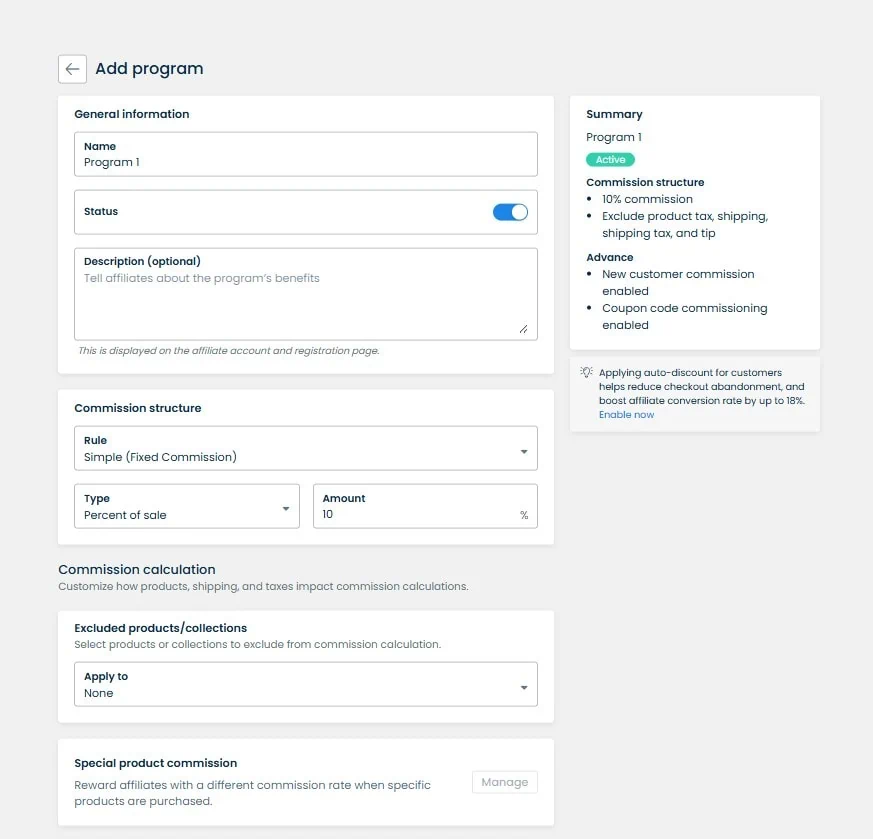
Render your dream rewards system with UpPromote’s smart commission settings.
Affiliate Recruitment Tools
Finding affiliates is one of the most important parts of building a successful program. But searching for them isn’t always easy.
Reaching out one by one, sending emails, or relying on word of mouth can be slow and take time. That’s why good affiliate software should give you more than just tools to track and manage affiliates. It should support your recruitment process and offer built-in tools that make looking for the right affiliates easier.
Here are some features to look for:
- An affiliate sign-up form that’s branded and easy to customize, giving partners a clear way to apply
- An affiliate marketplace where your program is discoverable by thousands of affiliates already looking for new opportunities
- Customer referral tools that help turn your happy customers into affiliates
- Multi-tier recruitment support that lets affiliates earn a small bonus or commission when someone they referred also becomes an active affiliate
- Approval workflows and segmentation so you can screen applicants, group affiliates by type, and assign different commission structures easily
Strong recruitment tools help you go beyond waiting for sign-ups. They give you the systems to grow intentionally, with the right people, on the right terms.
With UpPromote, the affiliate marketing software will enable you to create a branded registration page and approve new affiliates automatically. You can turn your customers into affiliates with a refer-a-friend program, set up MLM to recruit more affiliates, and even tap into a built-in marketplace where affiliates can discover your program.
Quickly find top affiliate marketers, grow your network, and boost your sales with UpPromote.
Affiliate Management Tools
Bringing affiliates into your program is just the beginning. The real work is managing them well so they stay active, feel supported, and keep delivering results.
But when your program grows, keeping everything organized can quickly become messy. Manually tracking communication, sending assets, or checking performance for dozens of people isn’t scalable.
That’s where affiliate software steps in. It gives you the tools to manage all your affiliates from one place and keep things running smoothly.
What should strong affiliate management software look like?
- Simple affiliate onboarding with built-in registration flows, instant approvals, and welcome messages to help new partners start fast
- Easy link and coupon creation so you can quickly generate personalized tracking assets for each affiliate when needed
- An affiliate portal where each partner can log in, get their tracking links or coupon codes, access creative assets, and check their performance in real time
- Activity logs and status tracking so you know who’s active, who’s slipping, and who might need a check-in
- Messaging and announcement tools to keep affiliates informed about new products, seasonal promos, or changes to your program
- Bonus and performance incentives to reward top-performing affiliates through milestone bonuses or special campaigns
- Fraud detection tools that flag suspicious clicks, fake referrals, or coupon abuse so you can act before it affects your budget
When affiliates feel seen and supported, they’re more likely to stick around and perform better. With the right tools, managing them doesn’t have to be hard. It becomes part of growing your business on autopilot.
If you use the affiliate marketing app UpPromote, you will get essential features to do just that. UpPromote helps you simplify onboarding, track commissions, segment partners, communicate at scale, send bonuses effortlessly, and detect fraud without burning out your team.
Join 115,000+ UpPromote users to take full control of your affiliate programs for the best results.
Reporting & Analytics
You can’t improve what you can’t measure and that’s especially true with affiliate marketing.
Without clear data, it’s hard to know who your top affiliates are, which products convert best, or which campaigns bring the most traffic. You might end up guessing instead of making informed decisions, which can cost time and money.
Good affiliate software gives you the reports you need.
Here’s what to expect:
- Real-time performance dashboards so you can track clicks, conversions, revenue, and commissions as they happen
- Affiliate-specific reports to compare partner performance and identify who deserves more attention, rewards, or coaching
- Campaign and product insights that help you see which promotions work, which channels perform best, and where to focus your efforts
- Custom date filters and export options so you can drill down into the data, share reports with your team, or analyze trends over time
With the right data, you can double down on what’s working, fix what’s not, and run your program with confidence, not guesswork.
If you’re using UpPromote, you can monitor affiliate performance closely and accurately through detailed reports and analytics. You’ll get key insights like affiliate count, total orders, commissions earned, and top traffic sources. All displayed in clear graphs, charts, and tables.
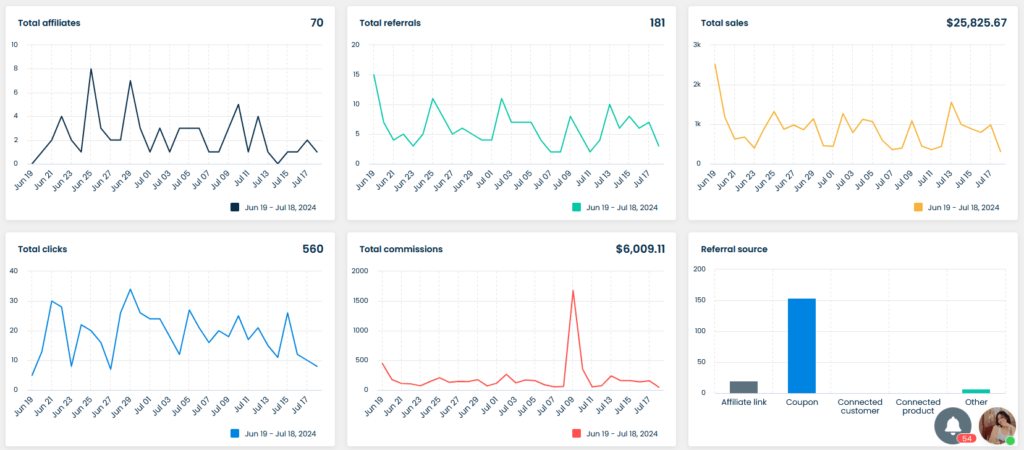 With this data at your fingertips, it’s easier to take action:
With this data at your fingertips, it’s easier to take action:
- Reach out to affiliates who underperform and offer help
- Adjust commission tiers to keep top partners motivated
- Test different rewards and campaigns based on real results
Integration Capabilities
Affiliate software isn’t meant to work in isolation. It needs to connect with the tools you already use to save time and avoid errors.
Without solid integrations, you could find yourself manually syncing sales data, struggling to track referrals, or missing key actions that affect commissions. That’s why integration capabilities are a must-have.
Here’s what great integration should look like:
- Ecommerce platform integration so the software can track orders, process conversions, and handle commissions automatically (for example, Shopify, WooCommerce, BigCommerce)
- Payment gateway support to process affiliate payouts via tools like PayPal, bank transfer, or other supported methods
- Email and CRM integrations so you can sync affiliate contacts, automate onboarding emails, and keep communication in one flow
- Marketing tool connections to share tracking links or promotions via your social channels, newsletter platforms, or campaign builders
- Custom integration options (via API or webhooks) for businesses that need extra flexibility or want to connect with internal systems
When your affiliate software plays nicely with your existing tools, everything just works better. You save time, reduce mistakes, and make your affiliate program feel like a natural part of your business, not an add-on you constantly need to fix.
Affiliate Software vs. Affiliate Network: What’s the Difference?
If you’re looking into affiliate marketing, you’ll likely come across two common paths: affiliate software and affiliate networks.
At first glance, they may seem similar. Both help you launch and run an affiliate program. But they do it in very different ways. Choosing which one depends on your business goals, technical resources, and how much control you want.
Here’s a simple breakdown of affiliate software vs. affiliate network:
| Criteria | Affiliate Software | Affiliate Network |
| How it works | You run the program yourself using a software solution | You join a third-party platform that connects you with affiliates |
| Control | Full control over rules, branding, and data | Limited control; platform rules apply |
| Customization | Highly customizable based on business needs | Limited flexibility; fixed templates |
| Recruiting affiliates | You bring in your own affiliates (or use a built-in marketplace if the software has one) | Access to a large pool of affiliates already in the network |
| Data ownership | You own all affiliate data | Network controls the data |
| Cost | Pay for the software (monthly or yearly), no cut of your revenue | Often charge setup fees, plus a % of your affiliate sales |
| Setup & maintenance | Self-managed with automation | The network handles most of the operations |
| Best for | Businesses wanting full control and customization for long-term growth | Brands that want a fast setup with minimal internal resources |
💡So, which one is right for your brand?
If you want full control, long-term flexibility, and access to your affiliate data, affiliate software is likely the better fit. You’ll be able to build your program your way, create stronger relationships with affiliates, and avoid paying high commissions to third-party networks.
Affiliate networks, on the other hand, can be a shortcut. You get immediate access to thousands of affiliates, but you trade that for higher costs and less control.
Many businesses start with a network, but switch to software as they grow and want more control. That’s exactly what happened with Breeze eSIM.
They tested both UpPromote and AWIN, but quickly saw the benefits of using affiliate software.
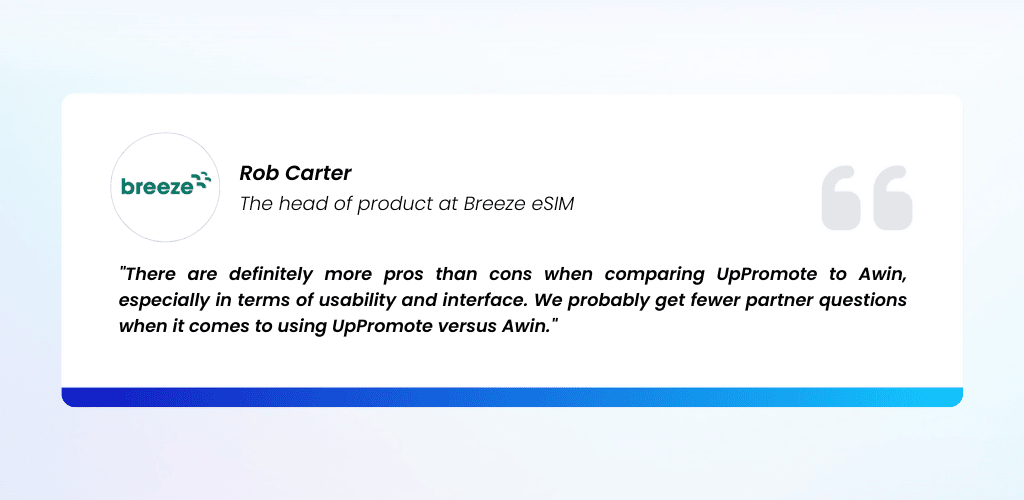
AWIN didn’t connect well with Shopify, which made routine tasks more complicated. In contrast, UpPromote offered a more seamless workflow, from syncing refunds to handling affiliate tags with ease.
Beyond ease of use, UpPromote also gave them the flexibility to launch advanced campaigns, including MLM features, special commission setups, and CRM integration. Everything was tailored to match Breeze eSIM’s unique business needs.
Easily start your affiliate program without tech skills and prior experience. UpPromote’s simple interface, along with built-in tooltips, guides you every step of the way.
How to Choose the Best Affiliate Software for Your Business
There’s no one-size-fits-all solution when it comes to affiliate software. Each platform comes with its own strengths, features, and pricing, so the best choice really depends on what your business needs right now and where you want it to go.
Before you commit to any tool, here are four things to look at to make sure it’s the right fit:
Match Software Features to Your Business Needs and Types
Before comparing platforms or checking feature lists, take a step back and think about your business. What you sell and who you sell it to plays a big role in deciding which affiliate software is the right fit.
Different business models have different needs. Here’s how to think it through:
If you run an eCommerce business (selling physical products)
Look for software that integrates well with your store platform (like Shopify or WooCommerce). You’ll need:
- Coupon tracking and product-level commissions
- Easy link creation and sharing tools
- Custom sign-up forms for influencers or creators
- A clear dashboard for affiliates to see sales and payouts
These features make it easier to work with a large number of affiliates and promote a wide product catalog.
If you sell subscriptions or digital services (like SaaS)
Recurring commission is key. You should also look for:
- Lifetime or recurring payouts
- Integration with billing tools like Stripe or PayPal
- Reliable tracking across free trials, upgrades, or renewals
- API access for more flexibility if you have a custom setup
This helps reward partners for long-term customer value, not just one-time sales.
If you run a B2B or high-ticket business
You may not need thousands of affiliates, just a few strong ones. In that case, prioritize:
- Custom onboarding flows and approval settings
- CRM or email integrations
- Partner segmentation and personalized commission plans
- Deep performance reporting to measure ROI per partner
The focus here is on building long-term relationships with fewer, high-impact affiliates.
💡Keep in mind:
Many business owners choose software that looks powerful, but doesn’t match how their business actually works. When that happens, you end up either overwhelmed with features you don’t need or stuck without the functions that really matter.
Start by defining what you sell, how your sales cycle works, and what kind of partners you plan to recruit. Then find a platform that supports those needs, not just one that checks the most boxes.
Consider Budget and Pricing Models
Affiliate software pricing can vary a lot, and picking the wrong plan can eat into your profits or hold you back from growing.
Instead of just going for the cheapest or the most feature-packed option, think about how the pricing model fits your current stage and long-term goals.
Key things to evaluate:
- Monthly subscription vs. usage-based fees: Some tools charge a flat monthly fee, while others take a percentage of your affiliate sales or limit features based on usage. Be careful, the cheaper plan upfront might cost more as you scale.
- Free plans or trials: Many platforms offer free trials or starter plans. These are great for testing, but double-check what’s included. Some free versions have limited tracking, no integrations, or capped payouts.
- Feature-based tiers: Higher-tier plans usually unlock automation tools, API access, advanced reporting, or multiple user seats. If you’re planning to grow quickly or work with a team, it’s worth factoring this in.
- Customization and advanced features: Custom domains, branded affiliate portals, and flexible APIs often fall under higher-tier or enterprise plans. If you expect to need these, factor them into your budget early.
💡Tip: Think beyond today. Choose a platform that’s not only affordable now, but also scalable later, without forcing a costly migration when your program grows.
Check Reviews and Testimonials
When it comes to choosing affiliate software, don’t just rely on feature lists or marketing pages. What real users say can reveal a lot about how a tool performs in the real world.
When reading reviews, focus on these key areas:
- Ease of use: Are merchants saying it’s easy to set up and navigate? This helps you know if you can jump in quickly or need extra help.
- Customer support: Look for feedback about how responsive and helpful the support team is. If you hit a roadblock, fast and reliable support can really do the work.
- Scalability: Pay attention to how the tool works as programs grow. If other users report lagging dashboards or limited features once they hit a certain size, that’s something to watch for.
- Real-world outcomes: See what merchants say about actual results. Are they seeing more sales, better affiliate engagement, or smoother workflows?
- Frequent complaints: If lots of users complain about the same issues, like bugs or confusing features. That’s something to think about before you commit.
💡Tip: Don’t just look at star ratings. Take a few minutes to read what other merchants say on platforms like G2, Capterra, or the Shopify App Store. Their experiences can save you time, money, and stress.
Test the Platform Before Finalizing Your Decision
Even if a platform looks perfect on paper, the best way to know if it’s right for your business is to try it yourself.
Most affiliate software offers a free plan, free trial, or live demo. Don’t skip this step. It helps you see how everything actually works and if the features match your needs.
When testing, pay attention to the things that affect your day-to-day workflow:
- Is the interface clear and beginner-friendly? You should be able to navigate the dashboard, find settings, and launch tasks without needing a manual.
- How fast can you get started? Try setting up a test program. Creating a commission rule, setting up a sign-up page, or generating a tracking link. If it feels complicated, it might slow you down later.
- Does it offer a smooth experience for affiliates? Log in as a test affiliate to see what the experience is like. A clean, helpful dashboard makes it easier to attract and retain partners.
- Are the integrations reliable? If you’re using Shopify, WooCommerce, Stripe, or other tools, test the integrations. Smooth setup means less hassle in the long run.
- Is customer support actually helpful? See how easy it is to get help if something goes wrong. Look for live chat, helpful docs, or quick email responses that guide you when you’re stuck.
Treat the trial like a mini launch. Simulate your real use case so you know what to expect when things go live.
What Are the Best Affiliate Software Tools in 2026?
Looking for the best affiliate software in 2026? The right choice depends on your business type and goals.
Here are the top solutions worth considering:
For eCommerce Brands
UpPromote
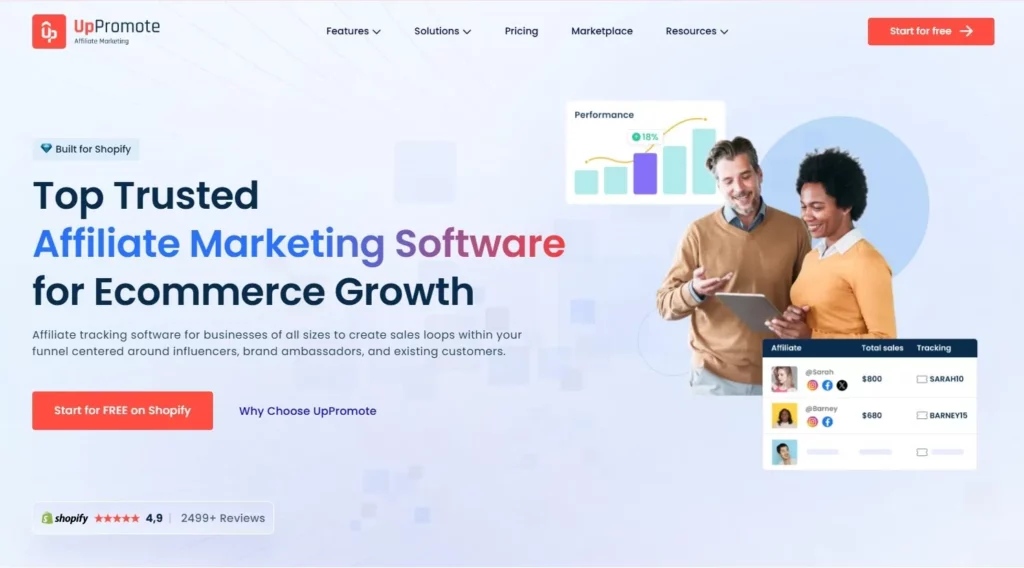
- What it is: The most trusted Shopify affiliate marketing app designed for launching and managing affiliate, influencer, and referral programs.
- Who it serves: ecommerce brands of all sizes looking to grow with affiliate marketing
- Key features: Dynamic commission settings, auto-generated links/ coupons, auto-tier commission, customized affiliate registration page, multiple affiliate tracking methods, multi-level marketing, affiliate marketplace, refer-a-friend program, PayPal auto-payouts, in-app chat with affiliates, fraud detection, real-time reports and analytics, multi-store support.
- Pricing: Free plan and free 14-day trial available. From $29.99 per month.
GOAFFPRO
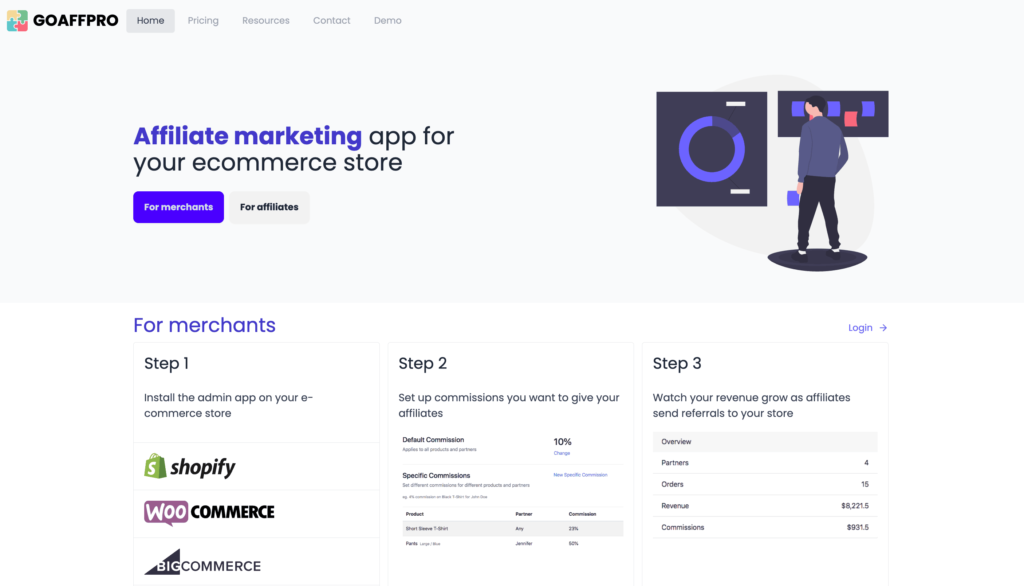
- What it is: A Shopify app for managing affiliate and influencer programs.
- Who it serves: Shopify merchants who want to scale affiliate networks with flexible options
- Key features: Support different commission settings, affiliate portal, multi-level marketing, post-purchase popups, fraud detection
- Pricing: Have a free plan. From $49 per month
Refersion
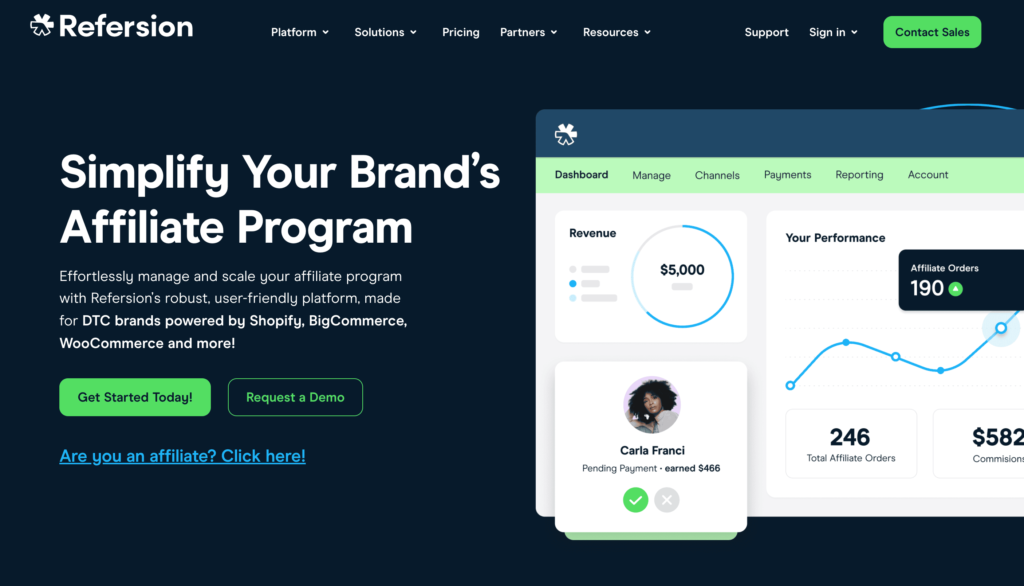
- What it is: Affiliate platform for DTC brands on Shopify/ WooCommerce/ BigCommerce
- Who it serves: eCommerce merchants scaling with ambassadors and influencers.
- Key features: Unlimited affiliates and conversions, first-party link, coupon, email & SKU tracking; affiliate marketplace, tiered and performance-based commissions, automated payouts with tax document support, affiliate reporting & analytics
- Pricing: Plan at ~$39/mo + commission; higher tiers available
Tapffiliate
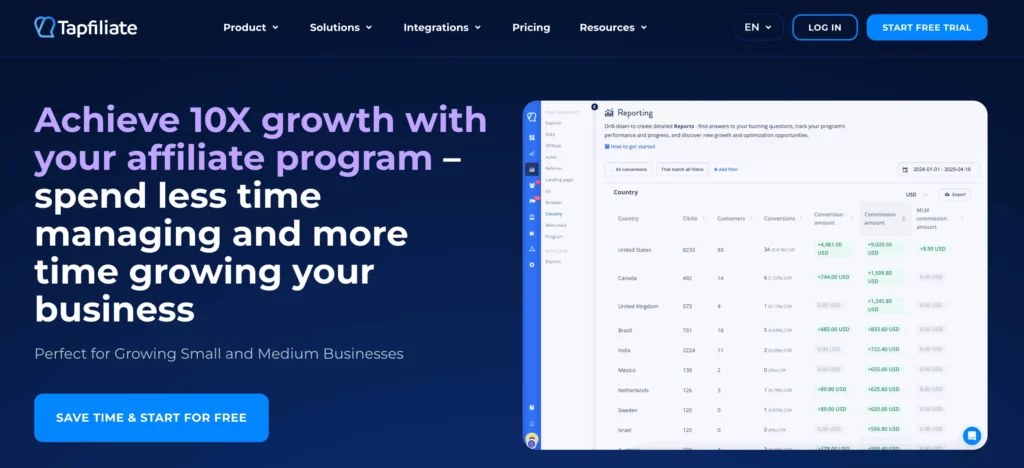
- What it is: Affiliate tracking and management platform for eCommerce brands
- Who it serves: Small and medium-sized businesses want to grow with affiliate marketing
- Key features: Unlimited affiliate programs, link and coupon tracking, supports recurring and lifetime commissions, branded dashboard with custom domain, multi-level marketing, multiple integrations, fraud protection
- Pricing: Does not offer a free plan. Paid plan starts at $89 per month.
Social Snowball
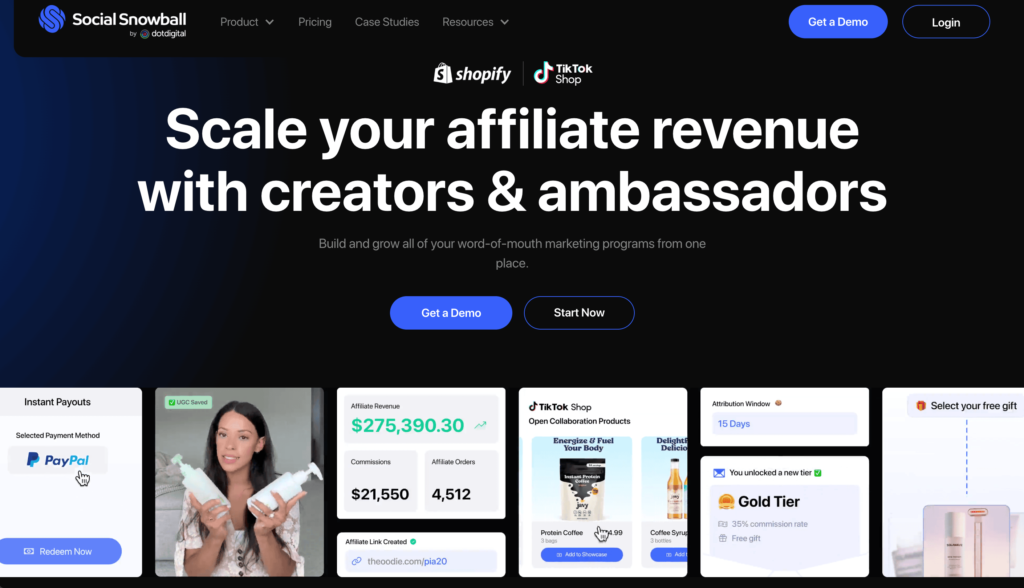
- What it is: An affiliate marketing platform built for eCommerce brands to scale word-of-mouth revenue through creators, ambassadors, and customers.
- Who it serves: Direct-to-consumer brands aiming to grow via post-purchase referrals, influencer partnerships, and ambassador programs.
- Key features: Dynamic coupon/link generation, affiliate portal, email automations, tiered commissions, fraud detection and analytics
- Pricing: No free plan. The standard “Snow Day” plan starts at $199/month + 3% of affiliate-driven revenue.
For SaaS & Subscription Businesses
Rewardful
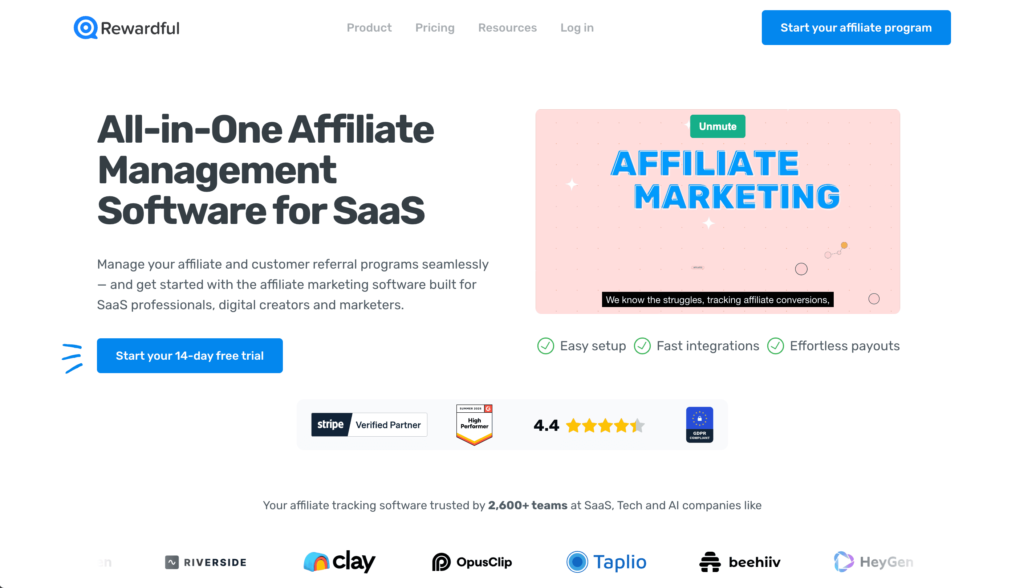
- What it is: Affiliate platform built for subscription billing with Stripe.
- Who it serves: SaaS and course providers needing recurring commissions.
- Key features: Stripe integration, lifetime/recurring payouts, partner dashboards, API.
- Pricing: Starts at $49/month
Tolt
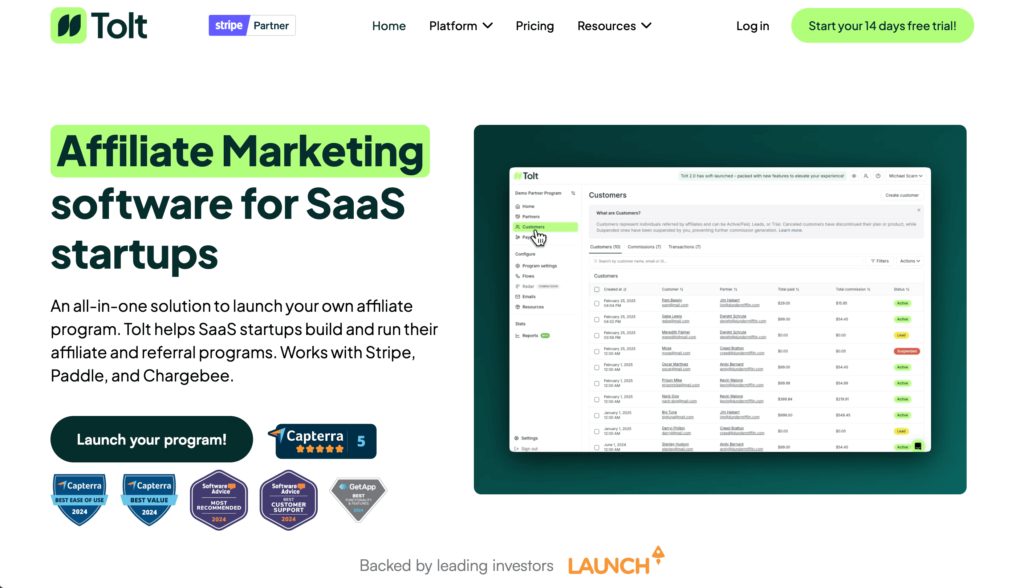
- What it is: Referral and affiliate tool for digital services.
- Who it serves: Membership platforms, subscriber-based businesses.
- Key features: In-app referral links, coupon codes, email templates.
- Pricing: Starting at $49/month
For B2B & Agencies
PartnerStack
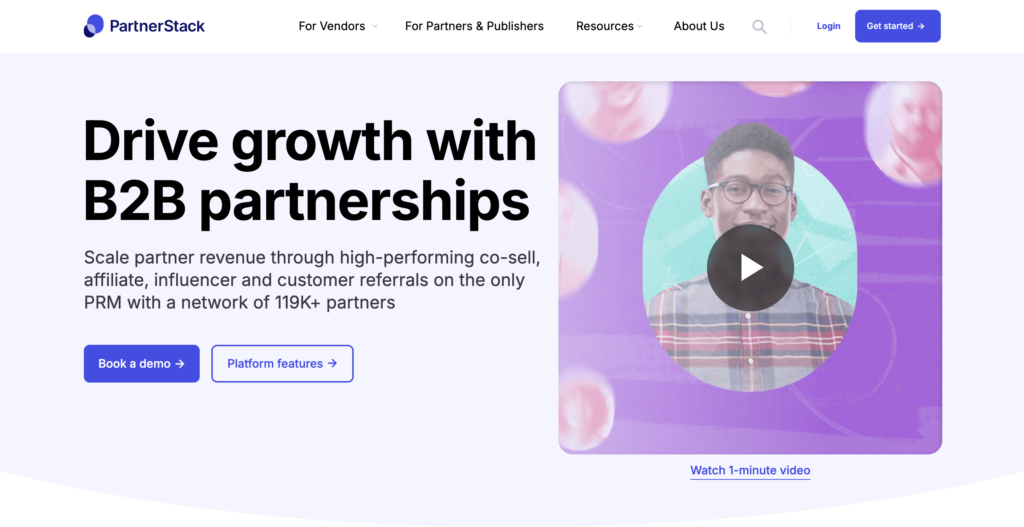
- What it is: Partner management platform for B2B SaaS.
- Who it serves: Companies building affiliate, referral, or reseller networks.
- Key features: Tiered partners, CRM integrations, onboarding workflows, detailed analytics.
- Pricing: Custom enterprise pricing
Everflow
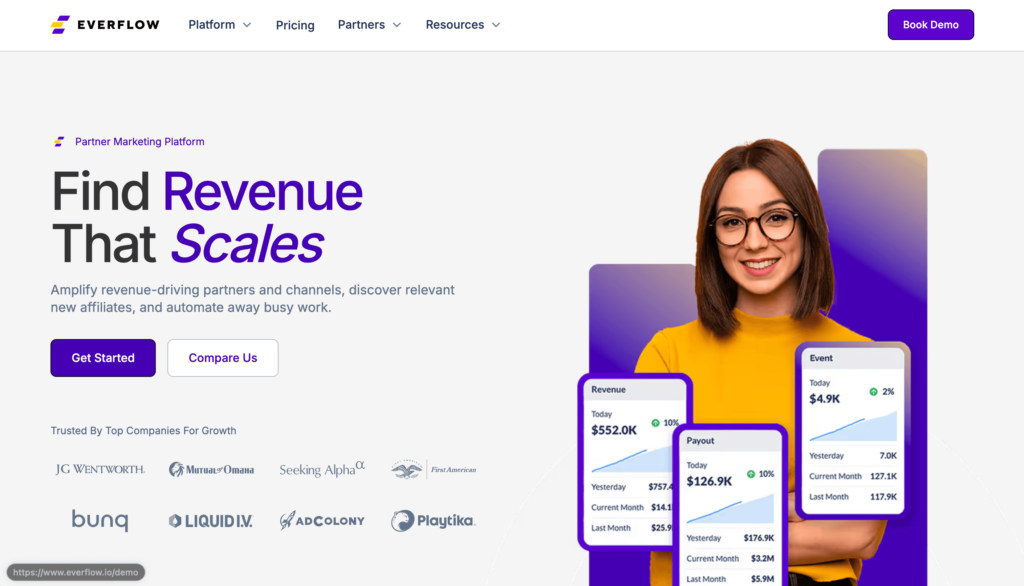
- What it is: Enterprise-level partner marketing solution.
- Who it serves: Agencies and large-scale affiliate marketers.
- Key features: Anti-fraud tools, real-time reporting, API support, campaign automation
- Pricing: From ~$750/month (custom quoted)
What Are Common Challenges When Using Affiliate Software?
Affiliate software is a powerful tool, but using it effectively doesn’t always come easily, especially if you’re new to affiliate marketing. Here are some of the most common challenges businesses run into:
- Getting started can feel overwhelming: If you don’t have a technical background, even basic setup steps like customizing a sign-up page or configuring tracking methods can take longer than expected. Some platforms aren’t as beginner-friendly as they claim to be. Without guidance or good onboarding, it’s easy to feel stuck.
- Keeping affiliates engaged is an ongoing job: The software helps you manage your program, but it doesn’t replace real relationship-building. If you don’t actively communicate, offer updates, or create bonus campaigns, even the best affiliates might lose interest.
- Limited customization can hold you back: Not all platforms let you tailor your program the way you want. For example, you might want different commission rates by product category, a custom affiliate dashboard, or unique onboarding flows, but find yourself limited by rigid settings.
- Fraud can still slip through: Fake clicks, self-referrals, and discount code abuse are common issues. If the software doesn’t have built-in fraud detection or alert systems, you might end up paying commissions for actions that weren’t real.
- Integrations don’t always work smoothly: Your affiliate program doesn’t live in a vacuum, it needs to connect with your eCommerce platform, checkout, email tools, and analytics. If the software doesn’t integrate well, you’ll spend extra time fixing issues or lose valuable data.
- Too much data, not enough clarity: Many tools offer reporting, but not all reports are easy to read or useful. You might see clicks and conversions, but still not know which affiliates are truly worth investing in or which campaigns are driving the best ROI.
These challenges don’t mean affiliate software isn’t worth using. They just highlight the importance of choosing the right one. The better the fit, the fewer headaches down the road. With the right tool and support, most issues can be handled smoothly.
FAQs
1. Is affiliate software expensive?
Not really. Many tools offer free plans or low-cost options to start with. You only need to upgrade when your program grows or you need more features.
2. What is the best affiliate marketing software?
It depends on your business type, goals, and budget.
For example, if you’re running a Shopify store, an affiliate marketing software solution like UpPromote is a strong pick. For SaaS, tools like Rewardful or Tolt work well. You should also consider ease of use, commission flexibility, fraud protection, and how well it connects with your existing tools. The best software is the one that matches your workflow and helps you grow without adding extra complexity.
3. How much does affiliate software cost?
The price of affiliate software varies quite a bit depending on features, scale, and business needs. Most entry-level plans start around $25/month and can go up to $750/month or more for enterprise solutions.
Some tools, like UpPromote, offer both a free plan and a 14-day free trial, great for getting started without upfront cost. More advanced plans with features like multi-tier commissions, fraud detection, or higher tracking limits usually come with higher monthly fees.
The best approach? Start with a plan that fits your current stage, test what you really need, and upgrade only when you’re ready to grow.
4. Which affiliate software is best for a small business?
Look for something simple and budget-friendly. UpPromote or GOAFFPRO are great for small teams that want to launch quickly and grow over time.
5. Is affiliate software the same as an affiliate network?
No. Affiliate software is a tool you use to create and manage your own program. An affiliate network is a third-party platform that connects merchants with affiliates, but often takes a cut and offers less flexibility.
6. Is affiliate software worth it for small businesses?
Yes, especially if you’re looking for a low-risk, cost-effective way to grow. Affiliate software helps you build a scalable marketing channel powered by word-of-mouth, without needing a big team or upfront budget. You only pay commissions when sales happen, so it’s a smart, results-driven way to grow your business.
Wrapping Up
Affiliate software gives you the tools to run your program with more control, flexibility, and efficiency. It helps automate tracking, manage commissions, and support your affiliates better.
To choose the right solution, consider how your business operates, the type of products you sell, and your growth goals. Whether you’re running a small store or scaling a global brand, the right affiliate software can turn your partners into a powerful growth channel — but only if it fits your needs








